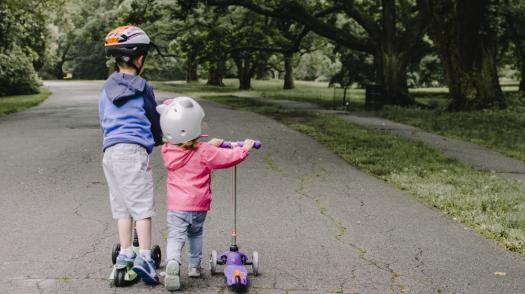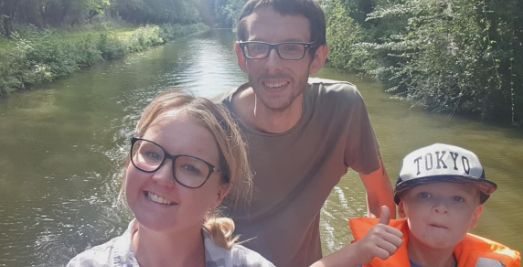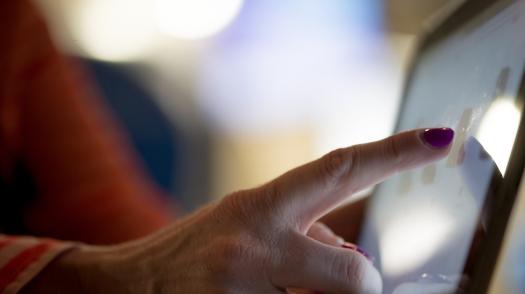
First time mum, living with a brain injury
Becki Felton sustained a serious brain injury after a near fatal accident, aged 14. Now 22 years old, she is a new mum to baby Oscar.
Becki was 14 when she sustained a brain injury after being knocked down. She talks candidly about how her brain injury affected her periods, relationships and starting a family.

Published: 14 September 2020
My brain injury was very serious, due to how shaken it was from the accident. There was a lot of damage. My pituitary gland, which is at the base of the brain and produces hormones, went into shock. This meant my periods stopped for some time and never really returned to how they were.
During one of the many hospital appointments when I was 15, I was asked if I had any questions. I said: “will I ever be able to have kids?” The doctor was shocked and seemed flustered. I supposed it’s not a question he expected a 15-year-old to ask. He said the damage was to my brain, and as I was only 15, it wasn’t something to worry about.
I will never forget that appointment. I was sad for years and assumed being a mother wasn’t going to be possible.
One of the effects of my brain injury means I don’t have much of a filter and sometimes I can say things that I shouldn’t. I have learnt to manage this better and people who know me understand.
When I was a teenager my lowered inhibitions meant I was an easy target for guys. I was naïve and believed them when they said they loved me and gave me flattering compliments.
During this time in my life, after the accident, I was painfully lonely. And I do believe that this contributed to some of my poorer choices from the ages of 14-16 when it came to boys.
Fortunately I have parents who could see that I was perhaps being led at certain times and they did what they had to do and stepped in. At the time I thought they were being controlling but looking back, as a mother myself, I can see I would do the exact same.
I would urge any teenager with a brain injury (or without) who feels under pressure when it comes to relationships, to talk to a safe person. This might be an aunt, a teacher, your GP or someone else. It can be hard to know who to trust and often hard to talk to parents about this sort of stuff. But loneliness, mixed with things like social media can be a very dangerous mix.
My advice to parents is to try to talk with your child as much as possible. As a parent you may not be able to stop who they fall in love with but be supportive and don’t criticise. There does come a time when you just have to be there for when it might go wrong.
I started going out with James – my now husband – when I was 16. We knew each other before my accident. He never took advantage of me and was so supportive and understanding of everything. He still is. I wrote a previous blog about the importance of his support throughout my ongoing recovery.
When I was 18, I became pregnant. This was a huge shock to me and James. We didn’t really think it was possible because of the damage to my pituitary gland. My periods were extremely light and were only regular, due to taking the contraceptive pill.
I was still very much in the process of recovering. I was suffering badly from depression at the time and I was self-harming. There were a lot of questions to be answered. Could I go full term? Would the baby get the correct hormones to grow properly? Would my stress, anxiety and paranoia affect the baby’s development?
I was still learning how to manage my fatigue and mental health and I worried how I would manage with a baby. For all of these reasons we knew it wasn’t right to go through with the pregnancy. It broke my heart but we knew it was too risky at that time.
Now, 14 years on from my accident, I am mum to six-year-old Oscar and due a baby girl, any day now. My pregnancy has been healthy. I’ve struggled with fatigue, particularly as Oscar has been off school for so long due to the pandemic. The tiredness from pregnancy and the chronic fatigue I have due to the brain injury isn’t a nice mix. It’s important to rest when I can.
I can’t have a natural birth because of the pressure of pushing, the damage to my brain and because of my shunt. It’s too risky. Initially I was gutted, as I wanted to have a natural birth but I know it’s for the best.
I take all the extra vitamins and injections that are recommended to make sure that anything I am lacking, the baby gets. During my first pregnancy I had a support worker who was with me most days and ensured I rested.
Due to the pituitary gland issues and the brain injury, I can’t produce much milk. It can be difficult after a c-section for any woman to produce milk to breastfeed but my history doesn’t help. But I have a breast pump to encourage the milk. As long as the baby is fed it doesn’t matter, there is no shame in formula. Any milk I can produce I will give to my baby but I am not putting myself under any stress or feeling bad over it.
Like any day, there are good days and bad days. What helps me is talking to others. Since moving to an area with lots of young families, I have met a lot of other mums. It’s a good support network and it’s also nice to hear other mums talking about similar struggles. It makes the parenting life far less lonely.
My brain injury presents extra challenges but we have ways of managing these. My son knows about these and it’s normal for him. We aren’t all perfect and as a parent I think it’s important to teach our kids about the real world and accepting that we are all different.
There wasn’t a lot out there when I had my accident as far as personal experiences go. It was all medical and professional opinion.
I have broken a lot of the expectations of how I should have recovered with my injuries. That’s why I like to share my story.
I know it won’t be the same for everyone but there could be one teenager or one parent that might be able to relate. I remember how lonely it can be, when the books are all facts and numbers.
The world has become so much more judgmental and due to internet trolls, people can easily be made to feel not good enough. People need to have honest talks and be real about things. That’s why I enjoy writing on forums like the Brain Injury Hub private support group when someone has something I can help with.
I still struggle with depression, anxiety and paranoia. But I am proud of who I am. I have a brain injury and, yes it makes some things difficult but if I hadn’t had my injury, I wouldn’t be able to help others. I wish I had accepted the new me years before I did.
My top tips for girls and young women with a brain injury who have concerns about hormones, relationships and having children:
If you have any concerns about the effect of brain injury on hormones, please talk to a healthcare professional. We also have information on our website or you can visit The Pituitary Foundation, the UK's leading charity providing support to people affected by disorders of the pituitary gland.

Becki Felton sustained a serious brain injury after a near fatal accident, aged 14. Now 22 years old, she is a new mum to baby Oscar.

This section talks about the steps towards adulthood after an acquired brain injury.